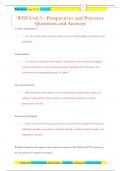1
Elscores: Aug. 27, 24- 2024/2025
WGS Unit 1 - Perspectives and Practices
Questions and Answers
Gender Arrangements
:-- the ways society creates, patterns, and rewards our understandings of femininity and
masculinity
Androcentrism
:-- A confusion of maleness with humanity, putting men at the center and relegating
women to outsiders in society; traditional notions regarding men as "humans" and
women and other marginalized people as "others."
First-wave Feminism
:-- Mid-nineteenth century period of social activism that sought women's rights and
suffrage (voting) activity, which sought to overturn legal obstacles to women's
participation in society.
Second-wave Feminism
:-- Refers to the twentieth-century period of social activism that addressed formal and
informal inequalities associated, for example, with the workplace, family, sexuality, and
reproductive freedom.
Women's studies has its origins in the women's movement of the 1960's and 1970's, known as
the "second-wave" women's movement.
Exams and Correct Answers |Best Grades | Excellence | Success & Guaranteed Pass
, 2
Elscores: Aug. 27, 24- 2024/2025
Third-wave Feminism
:-- Many writers refer to a "third wave" of feminist activity influenced by
postmodernism, queer theory, and multiracial feminism, which problematizes the
universality & potential inclusivity of the term "woman"
It has its origins in the 1990s and reflects the thinking, writing, and activism of those who came
of age taking for granted the gains of second-wave feminism, as well as the resistance or backlash
to it.
Third-wave perspectives are shaped by the material conditions created by globalization &
techno-culture and tend to focus on issues of sexuality and identity.
Contemporary third-wave activity has been important in fueling feminist activism, especially
through musical and art forms such as "zines" (conscious-raising magazines produced locally and
often shared electronically) and through social networking & other virtual technologies.
Intersectionality
:-- __ involves the ways all people's experiences of gender are created by the
intersection, or coming together, of multiple identities like race, ethnicity, social class,
and so forth.
Exams and Correct Answers |Best Grades | Excellence | Success & Guaranteed Pass
, 3
Elscores: Aug. 27, 24- 2024/2025
Patriarchy
:-- A system where men and masculine bodies dominate because power and authority
are in the hands of adult men.
LGBTQ
:-- lesbian, gay, bisexual, trans, queer; individuals whose sexual orientation is lesbian, gay,
bisexual, or transgendered, or who are currently questioning their sexual orientation
"First World"
:-- Women in the global north or __ __ societies are those with political and economic
privilege in the world order.
"Third World"
:-- Women in developing countries of the global south or __ __ nations are those
considered to be less politically and economically privileged.
"Two-thirds world"
:-- Note how the terms "First World" and "Third World" imply a hierarchical ordering.
The problematic nature of these terms is underscored by the phrase __-__ __ to
emphasize that the global north has defined most of the world as coming in third.
Liberal Feminism
Exams and Correct Answers |Best Grades | Excellence | Success & Guaranteed Pass
, 4
Elscores: Aug. 27, 24- 2024/2025
:-- This type of feminism believes in the viability of the present system (meaning the
system is okay) and work within this context for change in such public areas as education
and employment. They attempt to remove obstacles to women's full participation in
public life using strategies such as education, federal and state policies, and legal statutes.
These feminists simply want a piece of the pie, and have been critiqued as conservative
reformists on account of this perspective.
Radical Feminism
:-- This type of feminism (also known sometimes as radical cultural feminism or
difference feminism) wants a whole new pie. They recognize the oppression of women as
a fundamental political oppression wherein women are categorized as inferior based on
their gender. It is not enough to remove barriers to equality; rather, deeper, more
transformational changes need to be made in societal institutions (like the government or
media) as well as in people's heads.
Womanism
:-- A feminist perspective, the name of which was coined by Alice Walker, that seeks to
distinguish this approach from that of white feminism.
It is a social change perspective rooted in the lives of black women and other women of color
that emphasizes that social change begins with self-change, and critiques the location of
feminism in the ivory towers of academia.
Postmodernism
Exams and Correct Answers |Best Grades | Excellence | Success & Guaranteed Pass




